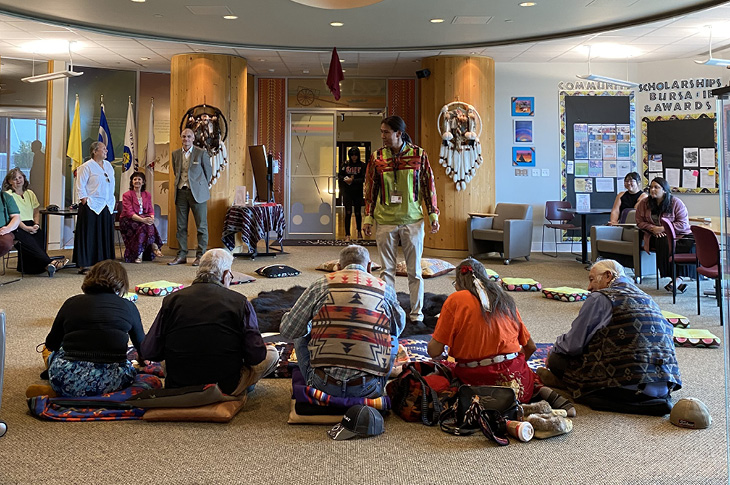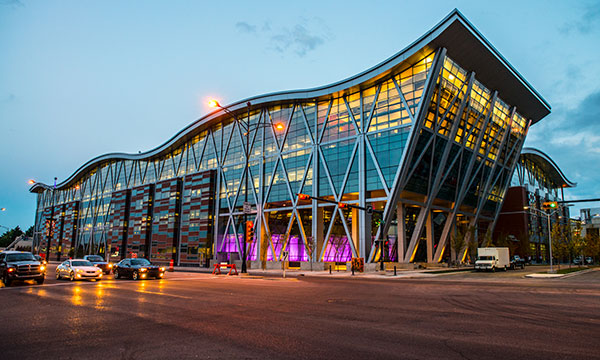SAIT student Indigenous resource centre receives Blackfoot name from Treaty 7 Elder
MEDIA RELEASE
Calgary, AB (Thursday, Sept. 21, 2023) — As National Day for Truth and Reconciliation approaches, the Southern Alberta Institute of Technology (SAIT) is reflecting on the efforts made towards decolonization and reconciliation, while recognizing there is significant work still to be done.
In the continued spirit of reconciliation, SAIT’s Indigenous resource centre Chinook Lodge has been renamed to connect the Indigenous student space back to its Blackfoot roots. Natoysopoyiis [nah-toy so-poh-yees], the new name for the space, means “holy wind lodge” in the language of the Blackfoot people.
“As we approach the fall equinox, give thanks for the harvest and hold ceremonies to honour the sun — we’ll soon begin to prepare for the coming winter,” says Steve Kootenay-Jobin, Manager, Indigenous Student Supports. “The timing feels appropriate to re-introduce our Indigenous space to the community and unveil the new name gifted to us by Elder Miiksika'am of Siksika Nation.”
When sharing the new name, Elder Miiksika'am described Natoysopoyiis as the wind carrying a sudden wet snowstorm which blankets the ground bringing moisture for the earth and life below. “This wind teaches us to prepare for unexpected weather change — like in life and unforeseen circumstances.”

In the spring, Jennifer Russell, SAIT’s Director of Indigenous Engagement and Kootenay-Jobin met with Elder Miiksika'am, who is a member and recognized spiritual leader of the Blackfoot Confederacy, to begin the process of renaming the Lodge. A Pipe Ceremony was held in the summer where SAIT and the lodge were gifted with the name Natoysopoyiis. Elders and Pipe Carriers from Treaty 7 communities participated and shared a feast following the ceremony.
“The strength in having the name changed to a word in the Blackfoot language is an acknowledgement and tribute to the first stewards of our land, as many students from these Indigenous communities pass through the lodge during their journey through higher education,” says Kootenay-Jobin.
Those in attendance at the Lodge renaming ceremony were introduced to SAIT’s new Indigenous Knowledge Keeper, Thomas Snow. A Knowledge Keeper refers to someone who has been taught by an Elder or a senior Knowledge Keeper within their community and holds traditional knowledge and teachings.
Snow grew up in Mînî Thnî — formerly known as Morley, and was raised primarily speaking Îyethka, or Stoney Nakoda Sioux. His grandparents were ceremonialists and his father apprenticed under his grandmother. His mother was raised traditionally and immersed in ceremony. Snow has dedicated his life to carrying on the customs and practices of his ancestors while passing on the teachings and growing as a leader in a humble way.
In an effort to provide employees and students with an opportunity to engage in meaningful conversations and gain deeper insight into Indigenous and Canadian histories, experiences and perspectives, SAIT will host a Truth and Reconciliation Event Series for employees and students. Beginning on Friday, Sept. 22, events will take place on campus until Wednesday, Oct. 4.
“Our event series is a positive step forward in SAIT’s truth and reconciliation journey. Having joined the institution in March, I am really inspired by the foundational commitment to decolonization and the collaborative spirit embracing our Indigenization efforts,” says Russell.
Events will include multiple speaker series on the topics of Treaty 7, residential schools and Missing and Murdered Indigenous Women, Girls and Two-Spirit Peoples, as well as a ceremonial flag raising, recognition of Orange Shirt Day and an Every Child Matters March.
“This is a time for the SAIT community to reflect on our commitment to fostering an inclusive and culturally sensitive learning environment and take meaningful steps toward truth, healing and understanding,” says Russell.
SAIT will be closed Friday, Sept. 29 in recognition of National Day for Truth and Reconciliation on Saturday, Sept. 30. Members of the SAIT community are encouraged to spend the day accessing educational and community-based resources and activities.
About SAIT
Established in 1916, SAIT was the first of its kind, publicly funded technical school in North America. As a global leader in applied education and research — serving nearly 40,000 students annually — SAIT offers certificate, diploma, post diploma, apprenticeship and applied degree programs, baccalaureate degrees, corporate training and more than 1,000 continuing education courses, along with four dedicated, award-winning areas of research and capacity for new and emerging research. Curriculum and research priorities are developed through industry partnerships to ensure graduates have the skills and knowledge required to fulfill the demand for talent. SAIT is honoured to be recognized by Mediacorp Canada Inc. as one of Alberta’s Top Employers for 2024, and to be ranked fourth by Research Infosource Inc. in the Top 50 Research Colleges in Canada for 2024. CEOWORLD Magazine ranked the SAIT School of Business #49 on the list of Best Business Schools in the World for 2024, and the School of Hospitality and Tourism placed #14 on their list of Best Hospitality and Hotel Management Schools in the World for 2024.
Connect with us: facebook.com/SAIT | twitter.com/SAIT | instagram.com/SAIT

Stay up to date with SAIT
Visit our Media Centre to access our media kits, expert biographies and most up-to-date news.

Oki, Âba wathtech, Danit'ada, Tawnshi, Hello.
SAIT is located on the traditional territories of the Niitsitapi (Blackfoot) and the people of Treaty 7 which includes the Siksika, the Piikani, the Kainai, the Tsuut’ina and the Îyârhe Nakoda of Bearspaw, Chiniki and Goodstoney.
We are situated in an area the Blackfoot tribes traditionally called Moh’kinsstis, where the Bow River meets the Elbow River. We now call it the city of Calgary, which is also home to the Métis Nation of Alberta.